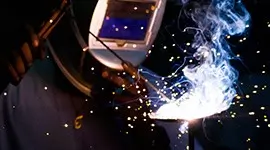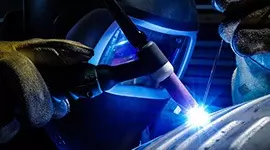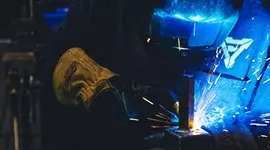UK Welding Machine Stockists
Coventry, Rugby, Oxford, Warwickshire
We are proud to be stockists of welding consumables and suppliers of many recognisable, reputable brands. We stock welding machines for different welding processes, some of our machines are multi-process to increase their versatility and value for money.
With over 30 years of experience in the industry, Davies Industrial & Welding Supplies Ltd is proud to be supplying to experienced domestic users, local businesses and construction trade users across Coventry, Rugby, Oxford and the surrounding areas.

Stick Welders
Stick welders, or formally known as Shielded Metal Arc Welding, is one of the most widely used and accepted arc welding processes in the industry.
If you learnt to weld some years ago, you likely learnt stick welding. Compared to other types of welding processes, stick welders are more versatile in that it's more forgiving in weather conditions such as wind.
The relative portability of a stick welder also makes it ideal for on-site welding or when access is limited.

TIG Welders
Although difficult to learn, TIG welding is heralded as the most sought after welding method because of its overwhelming advantages.
The lack of spatter and fumes gives the welder a clear view of the work in progress, and the degree of heat can be precisely controlled with a pedal. It can be used to weld almost any kind of ferrous and non-ferrous metal, including brass and titanium.
A filler rod can be used to reinforce the strength or improve the aesthetics of the finished weld.

MIG Welders
We are proud to work with the leading names in the industry and are stockists and suppliers of new MIG welders of different specifications.
MIG welding is an ideal introduction to the discipline of welding because it's the easiest to learn in all methods.
The official name for MIG welding is Gas Metal Arc Welding because it uses a shielding gas to protect the arc- the current between the base metal and the wire which melts the wire and joins it to the workpiece.
Safety Equipment
Before you start any after-sales services that involve welding, it's important to make sure you have the correct welding equipment, including but not limited to a fire-resistant jacket, safety glasses, welding gloves and the most important of all, an approved welding helmet. Since their initial development, welding helmets have developed dramatically with extra safety features.
It's easiest to look for an auto-darkening helmet to protect your eyes from the bright flare and sparks of the welding process. Adequate ventilation, such as a fume extraction system, is recommended. Because of the sparks, make sure there are no flammable materials on or around the welding work; choose a location that will give you plenty of room to let the sparks fly.
Choosing a Welding Machine
The most common welding processes are MIG, TIG and Stick. Each process has its benefits and limitations, meaning there's no "one-size-fits-all" process, they are each suited to their circumstances. Matching your needs and welding skills to the application and the welding process is important before choosing a specific model of welding machine.
As an example, you can weld aluminium with the MIG process, but you will get better results if you use a spool gun to feed the consumable rather than a wire feeder. Guidance from the manufacturer and/or the retailer about these details can help you decide on which welder to purchase.
Considerations and reviews of the other welding projects you have planned are important- what metal will you be welding the most? What thickness will these metals be? Where will you be welding them? All these can contribute to the decision of choosing the welder.
Welding Consumables
The flux is an important consumable in the welding process. Whether it's in an electrode coating or granular form, or a submerged arc flux, the requirements are the same.
Welding Supplies Coventry has a large range of fluxes in a number of forms, if you don't see a product you want, please get in touch, and we will try our best to source it for you.
The basic purpose of the flux is to provide a protective shield to prevent any atmospheric contamination to the electrode tip, the filler metal as it's transferred across the arc and the weld pool. Generally, it's achieved by decomposing the heat of the arc to form a protective gaseous shield.
As the most basic requirements, the flux should be able to:
- Removing any oxide film (failure to do so will result in oxide entrapment and damage the integrity of the weld), it must be able to react chemically with the oxide.
- Provide the desired weld metal composition, by transferring alloying elements across the arc
- Produce a slag which will shape the weld pool and if required, hold the pool in place in positional welding.
- Not produce large amounts of fume and, and any fume it produces should not be harmful to the welder.
Are you looking for welding supplies in Coventry, Rugby, Oxford or Warwickshire, get in contact today. Please call 01608 666110 to find out more.

